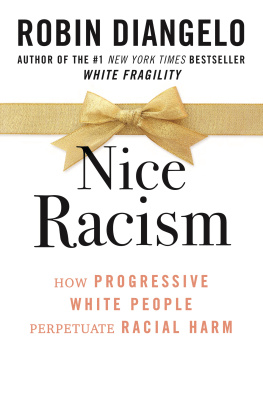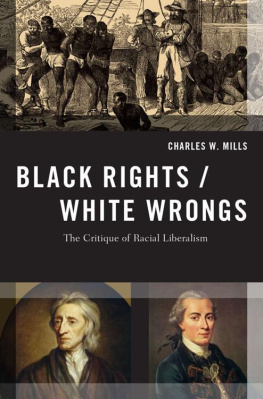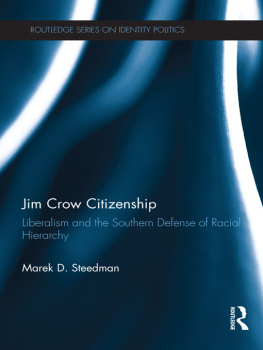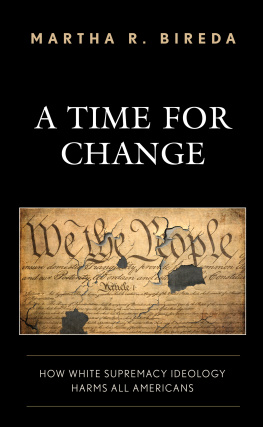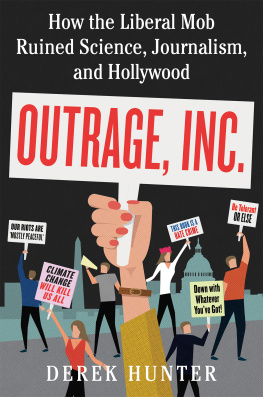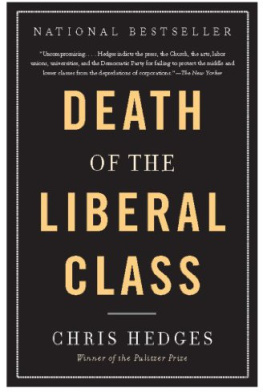Liberal White Supremacy

SERIES EDITORS
David L. Brunsma
David G. Embrick
SERIES ADVISORY BOARD
Margaret Abraham
Elijah Anderson
Eduardo Bonilla-Silva
Philomena Essed
James Fenelon
Tanya Golash-Boza
David Theo Goldberg
Patricia Hill Collins
Evelyn Nakano Glenn
Jos Itzigsohn
Amanda Lewis
Michael Omi
Victor Rios
Mary Romero
Liberal White Supremacy
How Progressives Silence Racial and Class Oppression
Angie Beeman
The University of Georgia Press
ATHENS
Sociology of Race and Ethnicity web page

2022 by the University of Georgia Press
Athens, Georgia 30602
www.ugapress.org
All rights reserved
Designed by Kaelin Chappell Broaddus
Set in 10.5/13.5 Garamond Premier Pro Regular by Kaelin Chappell Broaddus
Most University of Georgia Press titles are available from popular e-book vendors.
Printed digitally
Library of Congress Cataloging-in-Publication Data
Names: Beeman, Angie, 1977 author.
Title: Liberal white supremacy : how progressives silence racial and class oppression / Angie Beeman.
Description: Athens : The University of Georgia Press, [2022] | Series: Sociology of race and ethnicity | Includes bibliographical references and index.
Identifiers: LCCN 2022003524 | ISBN 9780820362274 (hardback) | ISBN 9780820362281 (paperback) | ISBN 9780820362298 (ebook)
Subjects: LCSH: LiberalismUnited States. | RacismUnited States. | Progressivism (United States politics) | Right and left (Political science)United States. | RadicalismUnited States. | United StatesRace relations. | United StatesPolitics and government.
Classification: LCC JC574.2.U6 B445 2022 | DDC 320.510973dc23/eng/20220412
LC record available at https://lccn.loc.gov/2022003524
This book is dedicated to my children, Justice and Hope. And to my father, Larry Beeman, who felt pride rather than shame in working-class identity; who was the first person to teach me about John Browns antiracism.
CONTENTS
The Friendliest Town
Confrontational Tactics and Liberal Acquiescence |
Walk the Walk but Dont Talk the Talk
Liberal Discourse, Radical Action, and Racism-Evasion |
ACKNOWLEDGMENTS
This book is the result of years of struggle, my own and those of the people I interviewed. Most importantly, I want to thank activists in the organizations I studied, and others, who work tirelessly against racism, class exploitation, transphobia, and patriarchy. So many people influenced the completion of this book through encouraging words, support through difficult times, and mentorship. I am grateful to one of my most influential mentors, Noel A. Cazenave, for encouraging me at every stage of my career to persist in the study of racism despite opposition. I continue to draw from Noels examples of strength and courage as I battle racial hostility in my everyday life and what he calls linguistic racial accommodation in academia. I have been fortunate to have had many wonderful colleagues and advisers who have offered valuable feedback on my work at various stages of my academic career: Vilna Bashi, Mary Bernstein, Deanna Chang, Alex Heckert, Harvey Holtz, Herbert Hunter, Bandana Purkayastha, and Evelyn Simien. I want to especially thank my collaborators, accomplices, and coconspirators, Tsedale M. Melaku and Soribel Genao, my friend Pekah Wallace, and my colleagues Lizette Coln and Cecelia McCall, who offered me valuable advice on addressing racial hostility as I worked through this and other projects. I would like to thank Melanie E. L. Bush for inviting me to present previous drafts of this work at the Society for the Study of Social Problems panel on The End of White World Supremacy; the Association for Humanist Sociology, where I presented this work for the session on Politics, Power and Resistance Movements; and Thinkolio, a Brooklyn-based organization that provided me space to write and invited me to speak at various venues.
I want to sincerely thank David Embrick and David Brunsma for editing this important series and believing in my work. I am grateful for the feedback they and anonymous reviewers provided. Noel A. Cazenave, Catherine Mulder, and my research assistant, Kristine Riley, provided feedback on previous drafts of this book. Additionally, I want to acknowledge my current and former students, who inspire me and continue to remind me of the importance of this work, especially Jessica Hsiao and Chandra Waring, who is now a brilliant professor working on racial injustice. I consider both these wonderful women my dear friends. I also spent a great deal of uninterrupted writing time at Willow and Olivia Bakery, so I thank the owner, Gia, for our chats and the best coffee I have ever tasted.
I am especially grateful to my children, Hope and Justice, and my husband, who encouraged me through the many challenges reflected in this book and gave me the space and time I needed to think and write. Justice happily read chapters, offering me feedback, examples, articles, and songs that she thought expressed the ideas I was communicating. Hope, with her gentle and quiet demeanor, always knows more than she lets on, and when I am fortunate enough to hear her ideas, she puts everything into perspective. I am blessed to have such thoughtful, intelligent, and compassionate people in my life. Everything I write is touched by their insight.
Last but not least, I want to thank my parents, Larry Beeman and Kye Sun (Yi) Beeman. Through their struggles and those we endured together, I learned valuable lessons about racial and class inequality, and about feeling pride despite these struggles. An important theme in this book is silence; silence on oppression as a means of preventing significant social change and as a strategic response to surviving it. It is also about teasing out the ironies and contradictions of color-blind ideology, racism-evasiveness, and liberal white supremacy. Whether they realize it or not, my parents taught me a lot about how to engage these silences and analyze contradictions. I grew up in a predominantly white, class-segregated community in western Pennsylvania. I wrote about some of these experiences in 2016 and connected them to the problems Hillary Clinton had relating to working-class people in Why Doesnt Middle America Trust Hillary? In my community, I dealt with both racist and classist bullying that took the form of physical and verbal attacks, including being called a Chinese chink, even though I was Korean. One of the ways I learned to deal with racist attacks against me at a very young age was by engaging in stoic silence. I recall several instances where my racist attackers were impressed with my ability to stand still and absorb their punches without reaction.
As early as kindergarten, I endured both physical and verbal abuse from children who would punch me, kick me, or call me names, while others insisted on knowing What are you? My ethnicity was such a concern that my teacher once asked the class what I should mark as my ethnicity on the California Achievement Tests, the standardized testing we took every year. When I told my parents about these instances, they responded, Tell them youre a human being. My father, being European American, did not know how to advise me on racist bullying, since he never really encountered it at the level I experienced it. My mother, having grown up in Korea and having immigrated to the United States in her twenties, did not deal with these kinds of questions as a child. She was also struggling to navigate her own experiences with everyday racism in the United States, her trauma, and her internalized oppression. Thus, color-blind humanism was the only suggestion my parents could provide.
Next page


